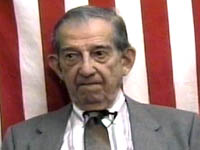|
{
align: 'left'
}
|
Rudolf H. Michaels |

Rudolf Michaels [detail from video] | World War, 1939-1945
Army
IPW Team #28, 5th Armored Division
Fort Monmouth, New Jersey; Fort Sam Houston, Texas; Camp Elliott, California; Camp Crowder, Missouri; Camp Ritchie, Maryland; European Theater
Major
**
 |
|
 |
Fleeing Nazi Germany, Rudolf Michaels came to the United States in 1938 at the age of 22. Drafted in 1940, he was assigned to the 5th Armored Division after the U.S. entered World War II. But in 1944, he was selected for training at Camp Ritchie, in the mountains of Maryland, where he and other German-speaking soldiers learned interrogation techniques to use on captured German soldiers in the European Theater in the last year of the war. (Michaels' interview is in two parts, conducted in sessions one week apart. Part 1 deals mainly with his intelligence work. Part 2 covers his experiences in the armored division, including the liberation of Paris.)
|
|

